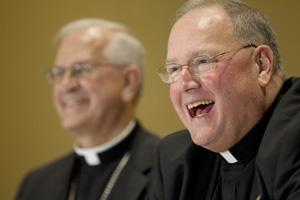
By Barb Arland-Fye
DAVENPORT — Bishop Martin Amos, back from the U.S. Conference of Catholic Bishops’ fall assembly Nov. 15-18 in Baltimore, recaps some of the topics of general interest to readers:
• The election of Archbishop Timothy Dolan of New York as president of the U.S. Conference of Catholic Bishops (USCCB), Archbishop Joseph Kurtz of Louisville, Ky., as vice president and Bishop Michael Bransfield of Wheeling-Charleston, W.Va., as treasurer. The election of Archbishop Dolan rather than vice president Bishop Gerald Kicanas was unusual, Bishop Amos said. However, many bishops learned prior to the assembly that Bishop Kicanas, as a seminary rector, allowed a seminarian to be ordained despite accusations of sexual misconduct against him. The priest, who has been laicized, spent time in prison for sexual abuse of minors.
• Approval for preparation of a brief policy statement on assisted suicide, to be voted on at the spring assembly. The bishops are concerned about the wider use of assisted suicide in the United States. “Our stance is to say we don’t approve of assisted suicide. Even suffering is redemptive,” Bishop Amos said.
• Affirmation of the “Common Agreement on the Mutual Recognition of Baptism.” The agreement recommends to all Reformed congregations and their pastors the issuance of a baptismal certificate at the time of baptism that attests to the use of baptismal washing and the baptismal formulae that the Catholic Church will accept as valid. This agreement now goes to partners in the Catholic-Reformed dialogue group for their approval, Bishop Amos said. The dialogue group represents the Presbyterian Church USA, the Reformed Church in America, the Christian Reformed Church and the United Church of Christ in addition to the USCCB.
• Approval of a $180 million balanced budget for the USCCB in 2011, and the rejection of an increase in the assessment on dioceses to fund the conference’s work in 2012. The Davenport Diocese’s assessment for 2010 is $18,721; its assessment for 2011 is $19,599, Bishop Amos said.
The bishop thinks it’s a good investment. “As a diocese we call the USCCB for advice on a lot of things, such as liturgical and legal issues. The assessment also recognizes the diocese’s commitment to being part of a bigger Church.”
• A reminder of the need to embrace social media to effectively evangelize the “digital continent.” Bishop Amos said the USCCB’s communications department gave an interesting and impassioned presentation on this topic. “If we want to keep the young people engaged we’ll have to meet them where they are at,” the bishop said. “It is an affirmation of the communications department (of each diocese). They are at the cutting edge of how the Gospel is going to be proclaimed to a generation that is very much involved in social media.” He plans to discuss that presentation with his board of directors.
• A plea from Archbishop Timothy Broglio for more chaplains to serve the needs of the military. He pointed to the many military personnel in their 20s and 30s, far from home and wanting to go to Mass but not having a priest available to celebrate the Eucharist. Bishop Amos noted that several priests of the Davenport Diocese have served or are serving the military in some capacity. One of them, Father Bill Kneemiller, recently completed a tour of duty as a chaplain in Afghanistan. Prior to that, he served as a chaplain in Iraq.
• Approval of a revised policy for issuance of USCCB statements and publications. The revised policy helps bring clarity concerning the weight, scope and targeted audience of statements, Bishop Amos said.
• Election of Bishop Amos as representative of Region IX for the USCCB. His one-year leadership duties begin in January 2011. He noted, jokingly, one vote against his nomination: his! The region represents Iowa, Missouri, Nebraska and Kansas.
• A report concerning the Catholic Campaign for Human Development (CCHD). The bishops have put into place stronger policies and clearer mechanisms to screen and monitor grants and groups, Bishop Amos said. “CCHD has been in existence for 40 years. My experience both in Cleveland and here is that CCHD has done tremendous work with the poor.” He said preference will be given to Catholic entities that work with the poor and marginalized.








